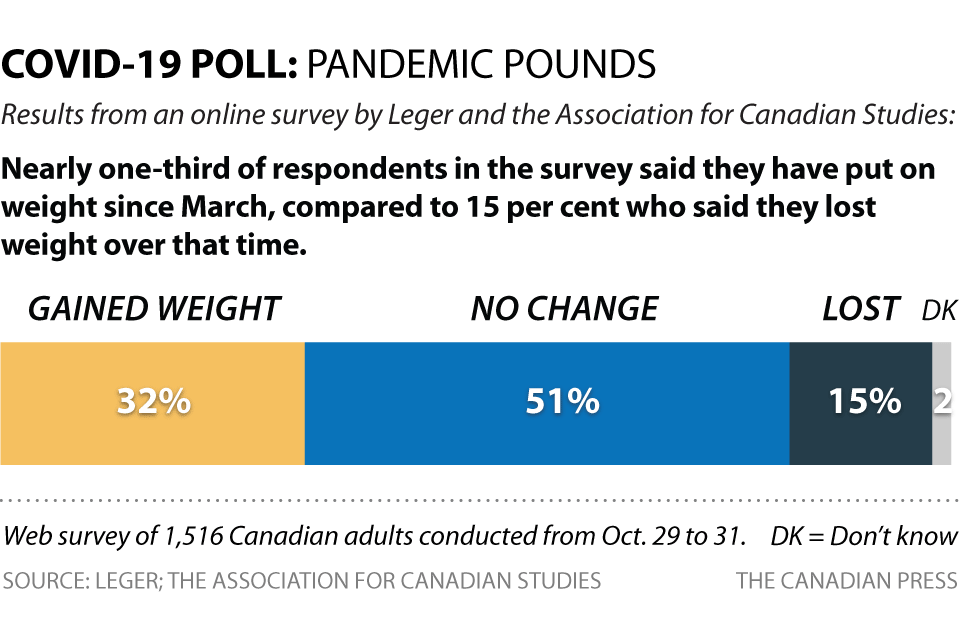A new poll suggests many Canadians are gaining weight because they’re eating more and exercising less during COVID-19 pandemic.

Nearly one-third of respondents in the survey conducted by Leger and the Association for Canadian Studies said they have put on weight since March, compared to 15 per cent who said they lost weight over that time.
READ MORE: 25% of Canadians say their mental health is worse than in 1st coronavirus wave, poll says
As well, about one-third of respondents said they’re exercising less, while 16 per cent said they’re working out more since the first wave of the pandemic landed in Canada in the spring.
Jack Jedwab, president of the Association for Canadian Studies, suggested that one reason may be a rush for comfort food to deal with pandemic-related anxieties.
Respondents in the survey who said they were “very afraid” of COVID-19 were more likely to report gaining weight, eating more and exercising less.

“The more anxiety you have, the more likely it is that you know you’re eating more,” Jedwab said.

Get breaking National news
“People who are least anxious about COVID (are) the ones that are not eating more than usual and are not gaining weight.”
The online survey of 1,516 Canadians was conducted Oct. 29-31 and cannot be assigned a margin of error because internet-based polls are not considered random samples.

Dr. Yoni Freedhoff, an associate professor of family medicine at the University of Ottawa, said there are plausible reasons to connect weight gain or loss with the pandemic, but he hadn’t seen any studies to convince him that’s the case.
Some people are “not reliant on restaurants constantly” and “cooking more frequently in their homes,” which Freedhoff said may be leading to weight loss or better dietary choices. Others are eating more, he said, relying on comfort food “because they’re anxious as a consequence of the pandemic, or the tragedies that have gone on in their lives.”
Jedwab said the country needs to also be mindful of mental health issues that can affect the physical health of Canadians.
“With the winter coming, it’ll be even more challenging, in some parts of the country, to maintain a healthy lifestyle in terms of walking, in terms of doing basic things that will help us address our anxieties,” he said, pointing to lack of access for some to gyms subject to local lockdowns.
Some of those exercise classes have gone online. Gabriel Shaw, a kinesiologist from Victoria, B.C. said he has offered virtual classes to give his clients a chance to be physically active.
Shaw said the classes don’t provide people with a sense of community like in-person classes, which he said is important for some people to exercise consistently.
“The best bet for people is to find a way they can enjoy it. That might be going out for a social distance walk or hike or run or bike with a friend,” Shaw said. “That might be finding a Zoom thing that you can get on like dancing or even other activities where you have friends.”
Shaw said people should also try learning a new skill like dancing, yoga, rock climbing, or take up running to keep things fresh and enjoyable, which is key to exercising long and well.










Comments